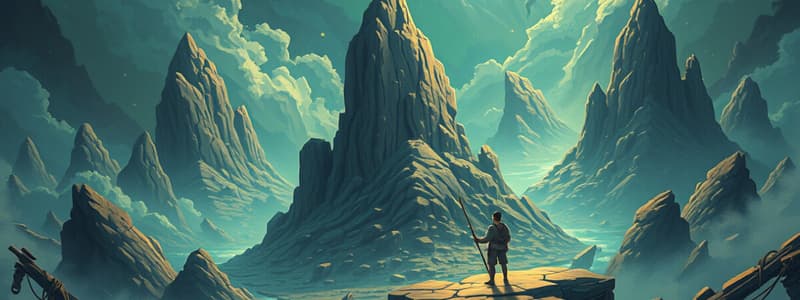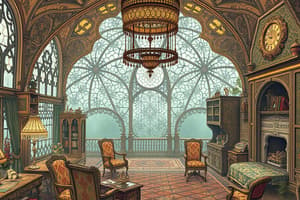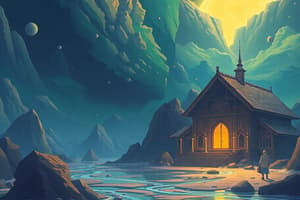Podcast
Questions and Answers
What is scarcity?
What is scarcity?
The condition of not having enough resources to produce all the things people would like to have.
What are the factors to prevent scarcity?
What are the factors to prevent scarcity?
- What to produce
- How to produce
- For whom to produce
- All of the above (correct)
What is the difference between wants and needs?
What is the difference between wants and needs?
A need is a basic requirement, while a want is something not necessary for survival.
TINSTAAFL stands for 'There Is No Such Thing As A Free Lunch'.
TINSTAAFL stands for 'There Is No Such Thing As A Free Lunch'.
What are the factors of production?
What are the factors of production?
What are capital goods?
What are capital goods?
Define labor in economic terms.
Define labor in economic terms.
Who is an entrepreneur?
Who is an entrepreneur?
What does Gross Domestic Product (GDP) measure?
What does Gross Domestic Product (GDP) measure?
What are consumer goods?
What are consumer goods?
What is a durable good?
What is a durable good?
What is a nondurable good?
What is a nondurable good?
Define services in economic terms.
Define services in economic terms.
Who are consumers?
Who are consumers?
What does value refer to in economics?
What does value refer to in economics?
Explain the paradox of value.
Explain the paradox of value.
What is utility?
What is utility?
Define wealth in economic terms.
Define wealth in economic terms.
What is a market?
What is a market?
What are factor markets?
What are factor markets?
What are product markets?
What are product markets?
What is economic growth?
What is economic growth?
What does productivity measure?
What does productivity measure?
Define human capital.
Define human capital.
What is the division of labor?
What is the division of labor?
What does specialization mean in economics?
What does specialization mean in economics?
What is economic interdependence?
What is economic interdependence?
What are trade-offs?
What are trade-offs?
Define opportunity cost.
Define opportunity cost.
What is a production possibilities frontier?
What is a production possibilities frontier?
What is an economic model?
What is an economic model?
What is cost-benefit analysis?
What is cost-benefit analysis?
Define a free enterprise economy.
Define a free enterprise economy.
What is the standard of living?
What is the standard of living?
What is an economic system?
What is an economic system?
What is a traditional economy?
What is a traditional economy?
What characterizes a command economy?
What characterizes a command economy?
What is a market economy?
What is a market economy?
Flashcards are hidden until you start studying
Study Notes
Fundamental Economic Concepts
- Scarcity refers to the limited resources available to meet all human wants.
- Key factors in addressing scarcity include determining WHAT to produce, HOW to produce, and FOR WHOM to produce.
- Needs are essential for survival, while wants are non-essential desires.
Economic Principles
- TINSTAAFL: emphasizes that everything has a cost; nothing is free.
- Factors of production include land, capital, labor, and entrepreneurship, all vital for creating goods and services.
Goods and Services
- Capital goods are the machinery, tools, and buildings used in production.
- Labor is the human effort applied in the production of goods and services.
- Entrepreneurs are individuals who initiate new businesses and drive economic change.
Measuring Economic Performance
- Gross Domestic Product (GDP) measures the total dollar value of all final goods and services produced within a nation over one year.
- Goods are tangible items that serve a purpose, while consumer goods are intended for final individual use.
- Durable goods last for 2-3 years, whereas nondurable goods last less than 2 years.
- Services encompass activities performed for others, like repairs and personal grooming.
Economic Value and Wealth
- Consumers are individuals who purchase goods and services.
- Value is the worth of a product based on its usefulness.
- The paradox of value illustrates the discrepancy between the low value of essentials (like water) and the high value of nonessentials (like diamonds).
- Utility is a measure of the usefulness of a product in providing satisfaction.
- Wealth is defined as the accumulation of valuable and transferable goods.
Market Dynamics
- A market is any mechanism that enables buyers and sellers to exchange products.
- Factor markets involve the buying and selling of production inputs.
- Product markets are where final goods and services are sold to consumers.
Economic Growth and Efficiency
- Economic growth occurs when the output of goods and services increases over time.
- Productivity measures the efficiency of production, indicating how much is produced.
- Human capital comprises the skills, knowledge, and health of individuals contributing to labor.
Organizational Structures
- Division of labor organizes work by assigning specific tasks to individual workers.
- Specialization occurs when workers focus on tasks where they hold a comparative advantage.
Interdependence and Decision-Making
- Economic interdependence describes the mutual reliance among people for the production and consumption of goods.
- Trade-offs represent the alternatives sacrificed when making a choice.
- Opportunity cost reflects the value of the next best alternative forfeited.
Economic Models and Assessments
- Production possibilities frontier illustrates the maximum combinations of goods and services an economy can produce using all resources efficiently.
- Economic models are analytical tools like graphs and equations demonstrating how aspects of the economy function.
- Cost-benefit analysis is a method of comparing the costs associated with an action to the anticipated benefits.
Economic Systems
- A free enterprise system is characterized by private sector decision-making regarding production and distribution, free from extensive government intervention.
- The standard of living measures quality of life based on access to necessities and luxuries.
- An economic system is an organized approach to meeting the population's wants and needs.
- Traditional economies rely on established customs and practices for resource allocation.
- Command economies depend on centralized authority for decision-making about production and distribution.
Studying That Suits You
Use AI to generate personalized quizzes and flashcards to suit your learning preferences.




